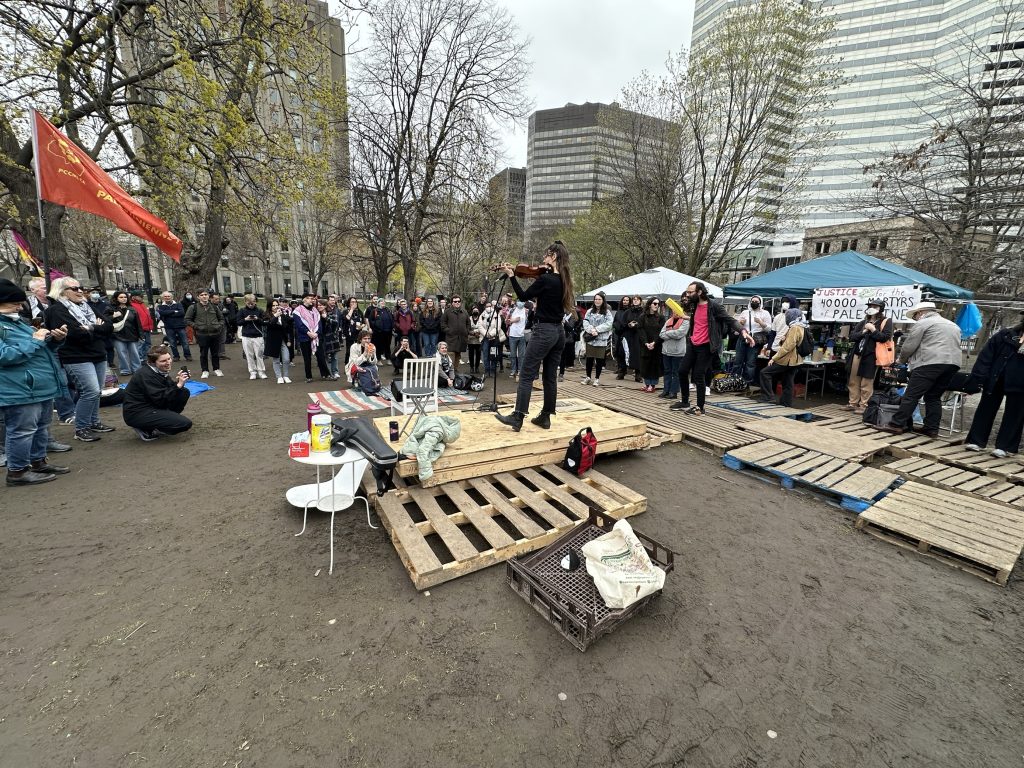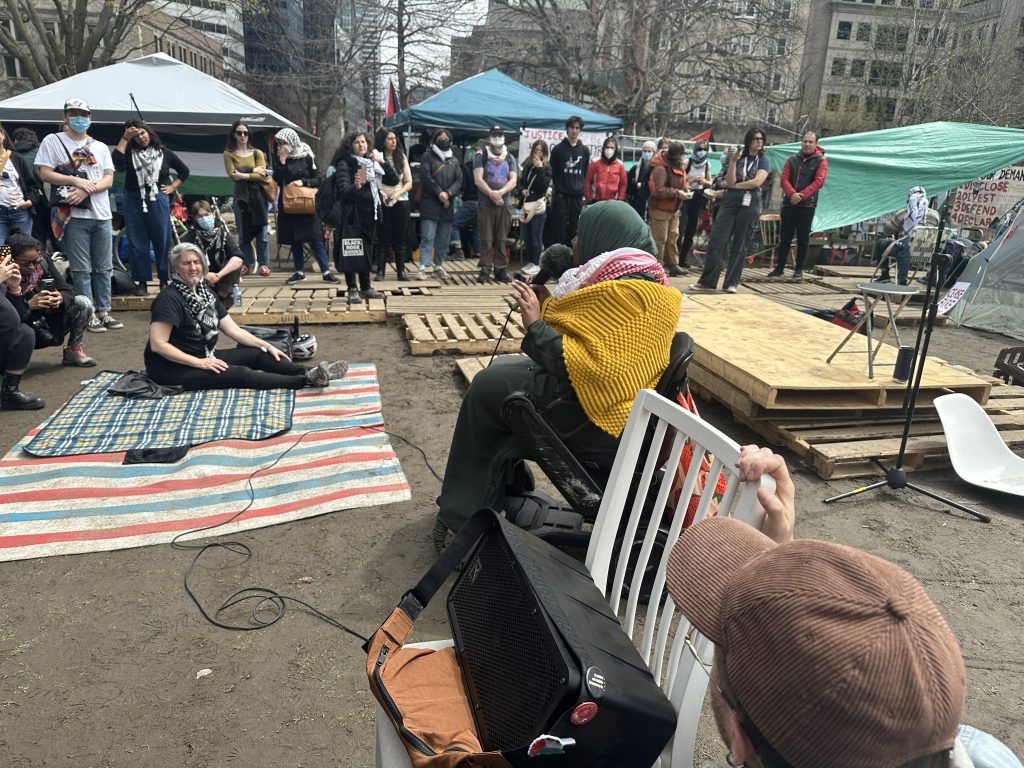Day seven of the encampment in support of Gaza at McGill University’s downtown Montreal campus remained status quo on Friday.
Meanwhile, Quebec Premier François Legault reiterated that it must be dismantled while the police remain “on the lookout for developments in the situation.”
Passing through his constituency of L’Assomption on Friday morning, Legault once again requested that “the illegal encampment” on the university campus be dismantled, even though the Superior Court of Quebec on Wednesday rejected a request for an injunction to move the camp erected since Saturday.
“There are all kinds of very legal ways to demonstrate,” but “to set up a camp on the grounds of a university which does not want this camp, it is illegal,” he argued, adding that he “counts on the police to dismantle in the way they think is best, then at the time they think is best.”
The premier made the same request on Thursday, 48 hours after university leaders requested police assistance, saying they had failed to persuade protesters to end what they called illegal action.
At the same time in Montreal, Quebec Public Security Minister, François Bonnardel, said that he had “total confidence in the SPVM for the future” and for the “operations that they will carry out to dismantle this.”

On Friday, the encampment on the McGill University campus had grown from a few tents to several dozen surrounded by metal fences. But protester Ali Salman, 19, said there were “no plans” to expand it beyond the 100 people he said planned to camp overnight.
“Hundreds of people told us ‘we want to camp,’ but since we’re not expanding the camp, we couldn’t let them in.” A hundred campers, he said, “is more than enough.”
Salman, a political science student at Concordia University, has been present on the site since the first tents were set up last Saturday. If the camp grows, he said, the militants will begin to have difficulty managing their supplies and taking care of everyone.
“But if we find that there is no communication with McGill, then we might reconsider our decision,” he said, referring to demands he and other protesters have made of the university.
On Friday afternoon, dozens of people showed up in front of the camp for a rally, “Artists in Solidarity with Gaza.”
“We just wanted to share words of encouragement and kindness with the students that are here who are facing a lot of internal and external pressure from people, calling them all types of things and not really respecting the humanitarian reason why they’re standing here,” said Narcy, Concordia University professor and multi-media artist.
Encampment participants and supporters say they’ll leave when McGill divests from companies they say are tied to Israel.
“We’ve been having battle after battle for the divestment,” said Ghayas Osseiran, McGill alumni and pro-Palestinian demonstrator. “We’ve had the referendum here where 78% of the students voted for divestment. The university wouldn’t budge.”
On Wednesday, McGill offered to hold a forum with students on their demands if they left the encampment.
“We’ve held forums before. The board of directors have held forums before. The senate has held forums before. Students have voted in a referendum before and none of those have led to any change in McGill‘s investment portfolio,” said Osseiran.
On Thursday, a counter-protest from pro-Israel demonstrators was held steps away from the encampment. Heavy police presence separated the two and it ended peacefully.
President and Vice-Chancellor of McGill University, Deep Saini, released an updated statement on Friday saying:
“Montreal police mobilized and worked successfully to avoid escalation. We are grateful for their expertise and continue to collaborate closely with them. […] We are focused on ensuring the health and safety of our community in this difficult and complex situation.”
In a separate letter e-mailed to the McGill community Friday, Saini said:
“Everyone has a right to protest and express their views in an appropriate manner and place, and I support the right of all members of the McGill community to do so on our campuses in ways that respect the law and conform to McGill’s policies and procedures. An encampment on the University’s property, including on its grounds, goes beyond those boundaries.”

Sarah Jama, Member of Provincial Parliament of Ontario showed her support for the McGill encampment Friday. “It is very important to continue to hold your ground,” she said in a speech in front of the encampment.”
“No one is willing to budge until McGill divests or until we can cause a change in our surroundings,” said Osseiran. “It’s different from all the previous years. We’ve never seen such a strong response from the community.”
Police assess the situation
The SPVM said in a press release Thursday evening that it had taken note of the decision rendered by the court to reject the request for a provisional injunction from two McGill students, due to of “the absence of demonstration of an emergency.”
The SPVM has indicated that it will closely follow “the legal debates surrounding this dispute” and will remain on the lookout for developments in the situation.
“Let us remember that the role of police officers in such a situation is to ensure peace, good order, the safety of people, while respecting rights and freedoms,” the statement reads.
On Thursday, Federal Minister of Justice Arif Virani rebuked Prime Minister Legault about his position. “Police operational decisions are always their decisions independently of politicians. This is always the case in a democracy like ours. (…) It separates us from other countries where we do not respect the rule of law, so it is extremely important,” he said upon his arrival at the Canadian parliament.
“A dangerous precedent”
Also Friday morning, the Quebec Federation of University Professors (FQPPU) published a press release in which it said it was “concerned about the recent comments” of the premier.
“University campuses have always been places where ideas confront each other, sometimes vigorously,” declared Professor Madeleine Pastinelli, president of the FQPPU.
“In a free and democratic society, it is not up to political power to give orders to the police on operational questions” and “that the Prime Minister attacks the freedom of expression of demonstrators by calling for an intervention by the police against them constitutes a dangerous and worrying precedent,” added the president of the FQPPU.
-With files from The Canadian Press